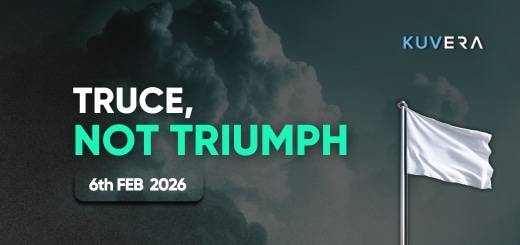For as long as stock markets have been operating in India and elsewhere, a common strategy that investors follow is ‘buy the dip’. Now, mutual fund investors seem to be catching on, too.
According to data from the Association of Mutual Funds in India (AMFI), the money flowing into equity mutual funds soared to an all-time high of Rs 42,702 crore in July. That’s a staggering 81% jump from June.
Contributions via systematic investment plans also rose to a record, at Rs 28,464 crore, while the number of SIP accounts climbed to 9.11 crore from 8.64 crore in June. July was the 53rd month in a row that equity funds received inflows.
What explains this increase in mutual fund inflows, especially when foreign portfolio investors sold shares worth over $2 billion during July?
Essentially, investors ‘bought the dip’ after US-India trade tensions and tepid quarterly earnings by Indian companies dragged down the stock markets. While the benchmark Sensex and the Nifty 50 fell about 2.9% each in July, the small-caps slipped 5.8% and the mid-caps slid 3.9%.
So, while flows into large-cap funds increased 25.5% to Rs 2,125 crore, mid-cap schemes received 38% more money at Rs 5,182 crore. As for small-cap funds, inflows surged 61% to Rs 6,484 crore. Similarly, inflows into multi-asset allocation funds nearly doubled to Rs 6,197 crore from Rs 3,210 crore in June.
At a broader level, what this basically means is that mutual fund investors are getting smarter and more confident.
But there may also be a flip side to it. And only a handful of people are pointing it out. One of those few is Sankaran Naren, the chief investment officer of ICICI Mutual Fund.
Naren, whose warning against stretched valuations of midcap and small-cap stocks earlier this year created a storm, raised a broader issue this week. In a podcast with a Moneycontrol journalist, he compared the stock market exuberance and the IPO rush of the past few years to the bull market of the 1990s and how it could affect the overall economy.
“Today, like in the ‘90s, the principal investing entity for the entire economy has become the stock market,” he said. “Investors are financing projects through IPOs, qualified institutional placements, giving exits to private equity, promoter blocks, and multinationals selling in India.”
Naren recalled that in the 1990s, when corporate earnings didn’t keep pace with high valuations, investors faced heavy losses. That situation could repeat itself now, he warned. He added that investors are now “obsessed” with equities and are ignoring asset allocation. “We tell them to invest in equity, debt, gold, REITs, liquid funds. But people are very, very focused on equity.”
It’s difficult to disagree with Naren, though some stock market pundits or MF veterans might still differ with him on some issues. What everybody can agree upon is that we all must follow an asset allocation plan depending upon our risk-taking ability and other factors. Do you follow such a plan or are you “obsessed” with equities? Let us know!

Go Nuts
Moving on to economic news, India’s inflation slid to an eight-year low of 1.55% in July. Food prices stayed in deflation zone, falling 1.76%. But if you were in Kerala, your wallet would tell a very different story. Inflation in the state hit nearly 9% in July, and this isn’t a one-off blip. The gap has been there for months; it’s just more glaring now.
So, what’s going on?
The inflation basket — the list of goods and services used to calculate the number — is customised for each state based on local consumption patterns. In Kerala, two items are largely responsible for skewing the numbers skyward: copra and coconut oil.
In July, inflation in copra was 60.75%, and in coconut oil, an eye-popping 131.77%. That’s even worse than the 41.17% and 97.27% recorded in June.
Why are prices of these two essentials on the boil?
The simple answer: supply is tight. Coconut production, the raw source for both copra and coconut oil, has fallen in the main producing states of Karnataka and Tamil Nadu. Yields have dipped too.
“But doesn’t Kerala have its own coconuts?” you might ask. It does, and in plenty. But production is still far short of the state’s needs. And here’s the kicker, who will go up the tree? The state has seen high migration to West Asia leading to shortage and high prices of labourers. Hence, plucking coconuts in Kerala is exorbitant.
And Kerala’s love affair with another commodity is also adding to the heat: gold. This week, gold touched a record high of Rs 1.02 lakh per 10 grams. No, there’s no production issue here as India imports nearly all its gold. The spike is thanks to global uncertainty driving investors into the metal as a safe haven.
In July, gold inflation was at 36%. That’s one reason India’s core inflation, which strips out volatile food and fuel prices, has stayed above 4% for months.
Why does core inflation matter? Because changes in interest rates by the Reserve Bank of India can’t do much to cool food or fuel prices.
So, is the RBI worried about core inflation refusing to budge?
Not exactly. The central bank has been signalling that if you strip gold out of core inflation too, the figure would fall to a much calmer 3.5%.
But here’s the question: is that too much creative trimming to arrive at a “comfortable” number? Or is it simply an honest acknowledgment that gold prices, which is driven almost entirely by global forces, beyond the RBI’s reach?
Minimum Balance, Maximum Backlash
Talking about inflation, no one saw this ‘price hike’ coming. ICICI Bank, India’s second-largest private-sector lender, this week increased the minimum balance requirement for new savings accounts.
It lifted the amount customers keep idle in savings accounts to a whopping Rs 50,000 from Rs 10,000 previously in metro cities and urban areas. It also hiked the minimum balance requirement to Rs 25,000 from Rs 5,000 for semi-urban branches, and to Rs 10,000 from Rs 5,000 for rural branches. It kept the limit for existing customers unchanged.
Now, most private banks require customers to keep between Rs 5,000 and Rs 10,000 as minimum balance in their savings accounts. The amount is even lower in case of public-sector banks, and State Bank of India has no such requirement at all. Banks also charge customers a penalty in case their minimum balance falls below the required levels.
So, when ICICI Bank raised its balance requirement by five times, it led to an immediate backlash.
Many people slammed the hike as discriminatory. Social media users called it elitist and urged the Reserve Bank of India to intervene, which brushed its hands off the matter. “In a country where 23 crore people live below the poverty line, ICICI thinks ₹50,000 is a ‘minimum’. Masterstroke!”, a social media user wrote.
Some people pointed out that the new requirements may create barriers for middle- and lower-income customers, especially since it exceeds the average monthly salary in India. Some users even threatened to close their ICICI accounts.
The widespread criticism yielded a result within days and ICICI Bank rolled back its decision. It has now revised the monthly average balance to Rs 15,000 for metro/urban areas, Rs 7,500 for semi-urban, and Rs 2,500 for rural branches.
Chips Are Down
In some international news, several American tech companies were in focus this week. These included AI startup Perplexity, led by IIT-Madras alumnus and its CEO Aravind Srinivas, and three chipmakers—Nvidia, AMD and Intel.
Perplexity AI this week made a surprise $34.5 billion offer to buy the Chrome browser from Google parent Alphabet Inc. This is a bold move, since the offer is higher than three-year-old Perplexity’s own valuation of $14 billion!
Perplexity, which has raised around $1 billion in the past from investors such as Nvidia and Japan’s SoftBank, has been in the limelight previously as well. In January, for instance, it made an offer to merge with TikTok US to soothe concerns about the short-video app’s Chinese ownership.
But what explains Perplexity’s interest in Chrome?
Well, web browsers have gained greater prominence in recent years thanks to the AI boom that has made OpenAI’s ChatGPT, Elon Musk’s Grok and other chatbots household names.
Perplexity already has an AI browser, Comet, and OpenAI is also working on one. But buying Chrome, the biggest browser in the world with more than three billion users, will help Perplexity take on bigger rivals like ChatGPT and Grok.
But is Chrome even up for sale? Not really. Last year, a US court ruled that Chrome had an unlawful monopoly in online search and the US government wants Google to sell the browser to resolve the case. Google, however, hasn’t budged yet and is expected to challenge the ruling since the browser is critical to its own AI ambitions.
Moving on to the chipmakers, Nvidia and AMD have struck a deal with US President Donald Trump that will allow them to resume chip sales to China. Trump had restricted chip sales to China in April. Under the new deal, both companies will pay the US government 15% of their revenue from semiconductor sales in China in exchange for the right to sell there.
Intel hasn’t yet agreed to such a deal but is expected to do so after Trump attacked its CEO Lip-Bu Tan over his alleged Chinese connections and said on social media that he “must resign, immediately.”
How will these developments affect the chipmakers? Nvidia’s 15% revenue share could cost the company about $3 billion per year. But there are broader issues at play here. Critics say that, historically, the US controlled the export of sensitive technologies only on national security concerns. Trump’s move has now made it a commercial decision. Moreover, if Trump can arm-twist the chipmakers so easily, who will he go after next? Let’s wait and watch out!
Market Wrap
Indian stock markets ended a six-week-long run of losses this week on optimism from cooling inflation and the extension of a truce between the US and China over tariffs. Both the benchmark Sensex and Nifty rose about 1% in the week through Thursday with markets remaining closed on Friday for Independence Day.
The small-caps gained 0.7% this week while the mid-caps rose about 0.9%. As many as 14 of the 16 major sectors climbed this week, led by pharma and IT companies, which earn a significant share of their revenue from the US.
Apollo Hospitals was the top performer, jumping nearly 10% after reporting strong quarterly results. Drugmakers Dr Reddy’s Labs and Cipla rose almost 5% each while Sun Pharma also ended in the green.
Wipro was the top IT stock, followed by HCL Tech. Infosys and Tech Mahindra, rose, too, but TCS ended in the red.
Zomato parent Eternal, HDFC Life Insurance, NTPC, State Bank of India, and automakers Tata Motors, Mahindra & Mahindra, Maruti Suzuki were among the other gainers.
IndusInd Bank was the biggest loser this week, followed by Adani Ports and Tata Steel. Bharti Airtel, Nestle, Bajaj Finance, JSW Steel, Hindustan Unilever and Reliance Industries also ended in the red.

Earnings Snapshot
- BPCL Q1 standalone net profit doubles to Rs 6,124 crore but revenue up just 1.2%
- Oil India’s standalone net profit drops 45% to Rs 813 crore
- State-run miner NMDC’s profit falls 1% to Rs 1,969 crore
- Hindalco posts 30.3% rise in consolidated net profit to Rs 4,004 crore, exceeds estimates
- Apollo Hospitals consolidated profit jumps 42% to Rs 433 crore, beats estimates
- Nykaa profit jumps to Rs 23.32 crore from Rs 9.64 crore a year ago
- Muthoot Finance profit soars 90% to Rs 2,046 crore, tops analysts’ estimate
- Domino’s Pizza operator Jubilant Foodworks profit up at Rs 91.76 crore vs Rs 55.8 crore year ago
- KFC, Pizza Hut operator Devyani International profit falls 88% to Rs 3.69 crore
Other Headlines
- Infosys to buy 75% stake in cloud services unit of Australia’s Telstra for $153 million
- India’s net direct tax collections fall 4% year on year during April-August
- JSW Cement’s Rs 3,600-crore IPO subscribed 7.77 times
- RBI committee recommends AI framework for financial services sector
- SEBI proposes to add algo trading into stock broker regulations
- SEBI rejects Anil Ambani’s settlement plea over Yes Bank investments
- Space regulator IN-SPACe picks Google-backed PixxelSpace to build earth observation satellites
- Radico Khaitan ties up with superstar Shah Rukh Khan to launch premium tequila
- Paytm unit gets RBI approval to operate as online payment aggregator
- Air India suspends Delhi-Washington flights due to plane shortages, Pakistan airspace ban
- Elon Musk’s xAI to take legal action against Apple over App Store rankings
That’s all for this week. Until next week, happy investing!
Interested in how we think about the markets?
Read more: Zen And The Art Of Investing
Watch here: Investing in International Markets
Start investing through a platform that brings goal planning and investing to your fingertips. Visit kuvera.in to discover Direct Plans and Fixed Deposits and start investing today. #MutualFundSahiHai #KuveraSabseSahiHai










